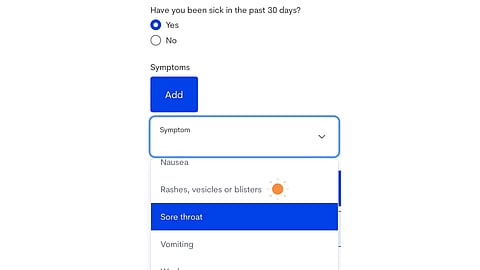
- NEWS
- the EDIT
- COMMENTARY
- BUSINESS
- LIFE
- SHOW
- ACTION
- GLOBAL GOALS
- SNAPS
- DYARYO TIRADA
- MORE

The Department of Health (DoH) on Thursday announced that the Bureau of Quarantine (BoQ) has updated the eTravel form for international travelers to prevent the entry of mpox cases.
In a message to reporters, DoH Assistant Secretary Albert Domingo explained that the update aims to prevent the entry of the more dangerous and transmissible mpox Clade 1b strain.
Domingo said that if a traveler answers “yes” to the question if they have been sick in the past 30 days, the drop-down list will now include the option “rashes, vesicles, or blisters.”
“It is important for all travelers to be honest in answering this question,” Domingo stressed.
If a traveler is determined, through the electronic form, to be from a country listed by the World Health Organization as an outbreak area, has a history of exposure to an mpox case, or exhibits any signs or symptoms, the etravel.gov.ph system will alert the Bureau of Immigration and the BoQ, Domingo said.
“The passenger will be referred by the BI to the BoQ for secondary screening,” Domingo said.
“If upon the assessment of BoQ personnel a traveler is determined to be a suspect case, they will be cared for and properly conducted to an mpox referral hospital,” he added.
Active cases
The DoH on Wednesday reported two more mpox cases, bringing the total case count to 14 since July 2022. Nine cases have long recovered since 2023, while five are active cases waiting for symptoms to resolve.
Common symptoms of mpox include a skin rash or mucosal lesions, which can last two to four weeks. The rashes are accompanied by fever, headache, muscle aches, back pain, low energy, and swollen lymph nodes.
Anyone can get mpox, and it can be transmitted to humans through close, intimate contact with someone infectious, with contaminated materials like clothes or utensils, or from infected animals.
Meanwhile, the DoH said it is not recommending any herbal medicine against mpox.
“At this point, we’re not recommending putting anything on the skin, whether it’s herbal, and not just for mpox but also for chickenpox,” Domingo said in a televised interview.
“Because there’s a risk of infection. Let’s also not pop our pimples because they could get infected with germs. It’s better to let them dry,” Domingo added.
The World Health Organization had advised not to pop blisters or scratch sores, as this could slow healing, spread the rash to other parts of the body, and cause sores to become infected.
